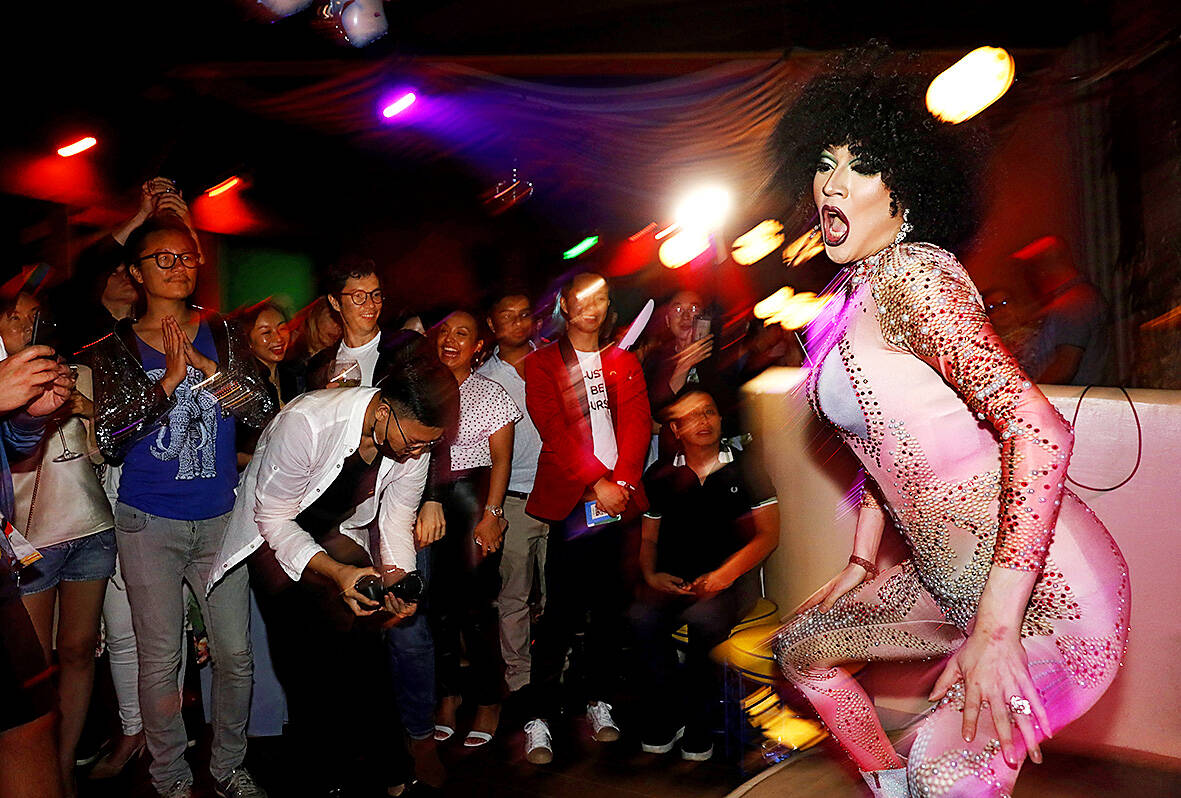On Nov. 24, exactly two years after a fire in an apartment building in Xinjiang killed 10 people and sparked a wave of historic protests across China, two dozen people gathered in a small bookshop in the Netherlands to reflect on the event.
“When anger becomes infectious, / when words are seen to be dangerous, / leave me blank, please!” Hongwei Bao, an associate professor at the University of Nottingham, read to the small, predominantly Asian audience.
Bao’s poem, White Paper, was inspired by the protests that erupted in China in late 2022, as anger spread about the harsh “zero COVID” measures that were seen as leading to the fire’s death toll and the suffering that people in China had endured on and off for three years during the pandemic. It was the biggest mass uprising against the government in decades.

Photo: Reuters
Bao was in the Netherlands to launch his new poetry collection, The Passion of the Rabbit God. The book’s title poem is a contemporary retelling of story of Tuer Shen, a mythical Chinese rabbit god who has become a symbol for the LGBT community.
“I can’t imagine that my book would be sold in China,” says Bao, who focuses on Chinese queer cultural studies. “Partly because it is written in English, partly because it touches on political and social issues such as queer rights and feminism … It is no longer possible to sell those books or publish those books in China.”
That Bao was able to present his work to a largely Chinese audience is thanks to Nowhere Netherlands, the latest branch of the Nowhere chain of Chinese-language bookstores that has set up shop in Chiang Mai and Taipei. Other independent bookshops have also been forced to close in China and Hong Kong, and are reappearing everywhere from Japan to the east coast of the US.

Photo: AP
Since China’s borders reopened at the start of last year, there has been a flood of people leaving the country, especially from the middle classes who had previously enjoyed a comfortable life in the country. While people have never had free rein to talk about certain topics, such as human rights and politics, for years the rising standard of living and limited space afforded to independent venues to hold small gatherings made living in a Communist party-controlled country worthwhile, or at least tolerable.
But now, for many, the calculation has changed.
China’s economic growth is slowing, with this year’s GDP expansion rate expected to barely reach the government’s target of 5 percent. And China’s president, Xi Jinping (習近平), has placed a renewed focus on national security at the expense of all manner of free expression. That has increased the pressure on independent outfits such as bookstores, cinemas and discussion groups.

Photo: EPA-EFE
Hosting even private gatherings of people who are known by the authorities to be interested in discussing topics such as feminism and human rights has become difficult. As well as selling thought-provoking titles, independent bookshops used to be places that held uncensored film screenings and talks by academics. But such activities are becoming harder to organize.
One victim of China’s crackdown on civil society was Jifeng Bookstore, a popular independent bookstore in Shanghai that was forced to close in January 2018 after the landlord refused to renew its lease. Yu Miao, Jifeng’s manager, thought it was the end of a two-decade run of serving curious and intellectual-minded customers in China’s most cosmopolitan city.
“At that time, my thought was that the bookstore was shut down, and I had done my best. I didn’t have any regrets,” says Yu, the bespectacled former businessman who bought Jifeng from its original owner in 2012.
Yu had long been familiar with the cat-and-mouse game of evading the authorities. But in 2017, as he explored trying to find an alternative venue for Jifeng, he realized that the shop was bugged. The local police told Yu they had recordings of the bookshop’s activities, and they seemed to know the content of even small meetings.
So the Jifeng team would gather at a nearby bookstore and cafe, for privacy. Its name was 1984.
The 1984 bookshop provided space for “a more relaxed conversation, and there was a cat there, which we really liked,” Yu recalls.
Today, however, Yu feels a world away from China’s all-hearing big brother. In September, more than 7,000 miles away from its original location, Jifeng reopened as JF Books in the Dupont Circle neighborhood of Washington DC. Already, Yu has received customers from New York, North Carolina, and Pennsylvania, including people who used to visit the shop in Shanghai.
JF Books is Washington DC’s only Chinese-language bookstore. Yu is hoping to recreate some of the cosmopolitan atmosphere that made the Shanghai branch unique. About 30 percent of his stock is English books, and the rest are Chinese-language volumes on politics, social sciences and philosophy, including titles by African and South American writers.
“In China, we used to say we were an independent bookstore, because we were independent from the power of the government … it showed a sense of freedom,” says Yu, who relocated to the US with his family in 2019. “But in the US, I don’t think the term ‘independent bookstore’ is very important to us any more.
“Because here, you are already independent, right? You don’t have an authority that controls you. So I usually don’t call my shop an ‘independent bookstore.’ It’s just a bookstore.”

Behind a car repair business on a nondescript Thai street are the cherished pets of a rising TikTok animal influencer: two lions and a 200-kilogram lion-tiger hybrid called “Big George.” Lion ownership is legal in Thailand, and Tharnuwarht Plengkemratch is an enthusiastic advocate, posting updates on his feline companions to nearly three million followers. “They’re playful and affectionate, just like dogs or cats,” he said from inside their cage complex at his home in the northern city of Chiang Mai. Thailand’s captive lion population has exploded in recent years, with nearly 500 registered in zoos, breeding farms, petting cafes and homes. Experts warn the

The unexpected collapse of the recall campaigns is being viewed through many lenses, most of them skewed and self-absorbed. The international media unsurprisingly focuses on what they perceive as the message that Taiwanese voters were sending in the failure of the mass recall, especially to China, the US and to friendly Western nations. This made some sense prior to early last month. One of the main arguments used by recall campaigners for recalling Chinese Nationalist Party (KMT) lawmakers was that they were too pro-China, and by extension not to be trusted with defending the nation. Also by extension, that argument could be

Aug. 4 to Aug. 10 When Coca-Cola finally pushed its way into Taiwan’s market in 1968, it allegedly vowed to wipe out its major domestic rival Hey Song within five years. But Hey Song, which began as a manual operation in a family cow shed in 1925, had proven its resilience, surviving numerous setbacks — including the loss of autonomy and nearly all its assets due to the Japanese colonial government’s wartime economic policy. By the 1960s, Hey Song had risen to the top of Taiwan’s beverage industry. This success was driven not only by president Chang Wen-chi’s

Last week, on the heels of the recall election that turned out so badly for Taiwan, came the news that US President Donald Trump had blocked the transit of President William Lai (賴清德) through the US on his way to Latin America. A few days later the international media reported that in June a scheduled visit by Minister of National Defense Wellington Koo (顧立雄) for high level meetings was canceled by the US after China’s President Xi Jinping (習近平) asked Trump to curb US engagement with Taiwan during a June phone call. The cancellation of Lai’s transit was a gaudy